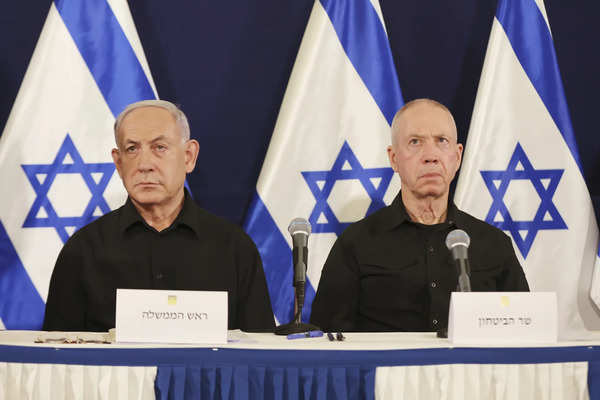Prime Minister Justin Trudeau expressed that Canada would comply with an International Criminal Court (ICC) arrest warrant for Israeli Prime Minister Benjamin Netanyahu. He emphasized that Canada is committed to upholding international law and adhering to the regulations and rulings of international courts, framing this as a core value of Canadian identity.
Trudeau said: “It’s really important that everyone abide by international law. This is something we’ve been calling on from the beginning of the conflict. We stand up for international law, and we will abide by all the regulations and rulings of the international courts. This is just who we are as Canadians.”
On Thursday, the ICC issued arrest warrants for Netanyahu and former Israeli defence minister Yoav Gallant, citing allegations of crimes against humanity and other offenses linked to the Israel-Hamas conflict, ongoing for over a year. The court also issued a warrant for Hamas military commander Mohammed Deif, though Israel claims he was killed in a Gaza airstrike in July. Both Israel and Hamas have denied the accusations.
Trudeau reiterated Canada’s call for a ceasefire to protect civilians and emphasized the need for progress toward a two-state solution, envisioning peaceful coexistence between Israel and a Palestinian state. Foreign Affairs Minister Mélanie Joly echoed this stance, affirming Canada’s commitment to fulfilling its obligations under the ICC treaty.
Netanyahu’s office criticized the arrest warrants, labeling them an antisemitic move, while Israel’s Ambassador to Canada, Iddo Moed, urged the Canadian government to reject and condemn the ICC decision, framing it as undermining Israel’s right to self-defense.
In contrast, the United States, not an ICC member, rejected the warrants outright, citing concerns about the ICC Prosecutor’s process and expressing its intent to coordinate responses with allies. The ICC, lacking its own enforcement mechanism, relies on its 124 member states, including Canada, to act on its rulings.
Why the ICC Issued an Arrest Warrant

FILE – Israeli Prime Minister Benjamin Netanyahu, left, and Defense Minister Yoav Gallant attend a press conference in the Kirya military base in Tel Aviv, Israel, Saturday, Oct. 28, 2023. (Abir Sultan/Pool Photo via AP, File)
The International Criminal Court (ICC) issued an arrest warrant for Israeli Prime Minister Benjamin Netanyahu and others based on allegations of crimes against humanity and other offenses. These charges reportedly stem from actions taken since the start of the prolonged conflict between Israel and Hamas. The court investigates and prosecutes cases of grave crimes, such as genocide, war crimes, and crimes against humanity, particularly in situations where national legal systems are unable or unwilling to pursue justice.
The ICC operates on the basis of complaints submitted to its Prosecutor, who then investigates whether there is sufficient evidence to pursue a case. This can include documentation from affected parties, states, international organizations, or civil society groups.
How the ICC Decides on Cases
The ICC was established in 2002 under the Rome Statute and has jurisdiction to investigate and prosecute:
- Genocide
- War crimes
- Crimes against humanity
- Crimes of aggression
Decisions to issue arrest warrants follow these key steps:
1. Jurisdiction: The ICC determines whether the alleged crimes fall within its jurisdiction, which applies to actions committed on the territory of member states or by nationals of member states.
2. Investigation: The Prosecutor gathers evidence, often involving extensive collaboration with states, international bodies, and witnesses.
3. Authorization: If sufficient evidence exists, the court issues an arrest warrant or summons for the individual.
4. Charges: The charges must meet the standard of being serious violations of international humanitarian or human rights law.
The ICC operates independently but is bound by its treaty and legal frameworks.
Who Must Comply
All 124 member states of the ICC, including Canada, are legally obligated to comply with its rulings and execute arrest warrants if the accused enters their jurisdiction. Compliance involves:
- Arresting and transferring the accused to The Hague, where the ICC is headquartered.
- Supporting investigations and facilitating evidence collection when requested.
- Ensuring that their domestic laws allow for full cooperation with the ICC.
States that are not members, like the United States and Israel, are not legally obligated to comply with ICC warrants. However, the ICC may still pursue its cases if the alleged crimes occurred on the territory of a member state or involve nationals of member states.
Challenges in Enforcement
The ICC lacks its own enforcement mechanism, such as a police force, so it relies entirely on member states to cooperate. In many cases, political considerations or opposition to the ICC’s authority can hinder compliance, as seen with resistance from countries whose leaders or officials are targeted by ICC rulings.
With inputs from agencies

